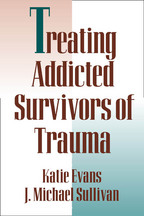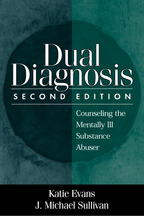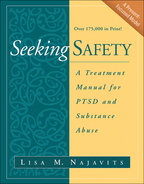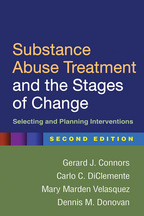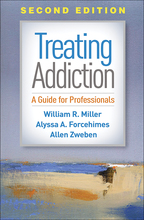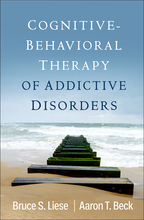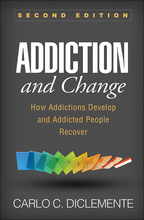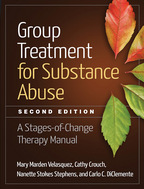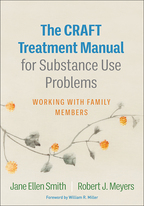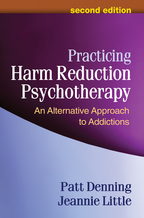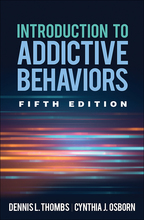Treating Addicted Survivors of Trauma
Katie Evans and J. Michael Sullivan
Paperback
Paperback
orderDecember 2, 1994
ISBN 9780898623246
Price: $43.00 283 Pages
Size: 6" x 9"
Sign up for emails on upcoming titles on Addictions (with special discounts)!
“I can't speak highly enough of this book. Reading it will benefit anyone who works with addicted and/or traumatized people. -The Post”

—Traumatic Gazette 1:3
“This book fills an important gap in the existing literature on how to treat clients who present with these co-existing issues. It also presents a philosophy of treatment which is egalitarian, feminist, victim-sensitive and non-blaming. Though written for clinicians, the book contains information which may be helpful for survivors struggling with issues of alcohol and/or drug issues.”

—Coalition Commentary
“Treating Addicted Survivors of Trauma deserves to become a basic resource for clinicians who work with addicted survivors of trauma. It is specific yet adaptable to a variety of therapeutic approaches. It is authoritative yet remarkably respectful of addicted survivors. The tone, as well as the content, of this book make it abundantly clear that the authors have 'been there' both as survivors and as therapists.”

—Marge Eide, Librarian, Eastern Michigan University, Ypsilanti, MI
“Despite a growing awareness of the links between childhood trauma and addictive behavior, few systematic clinical strategies have been developed for helping this client population. In this first-rate book Katie Evans and J. Michael Sullivan try to fill this gap. They offer a well-reasoned, conceptually sound and thoroughly referenced clinical model for working with addicted adult and adolescent survivors of childhood psychological and physical trauma.... It is the best clinical handbook for working with addicted survivors of trauma that I have come across.... Students and practicing clinicians will discover a gold mine of ideas in this book. Clinical researchers will find a coherent treatment model, which they can examine and subject to empirical verification.”

—Meredith Hanson, DSW, Columbia University School of Social work, New York, NY
“Incisive and sensitive at the same time; the best clinical guide of its kind.”

—James Fine, MD, SUNY Health Science Center of Brooklyn, Clinical Associate Professor, Dept. of Psychiatry, Director, Addictive Disease Hospital
“Contains a well-referenced, practical therapeutic method for engaging, understanding, and treating this population. The book includes a great deal of case material which is approached theoretically from a variety of well-described and referenced models, such that the reader understands both the why and the how of dealing with common difficult clinical situations. As usual, Evans and Sullivan supply tables, charts, and other materials which can be utilized directly in the clinical setting by both therapist and client. While therapists with 12-step and other addiction backgrounds will find this approach friendly and consistent, psychiatrists, psychologists, social workers, and other therapists will find it equally useful, sophisticated and effective.”

—Richard Ries, MD, Associate Professor of Psychiatry, University of Washington Medical School, and Director, Dual Disorder Programs, Harborview Medical Center, Seattle, Washington
“This book has vitality and clinical savvy. It is rich in examples with many pearls of wisdom sprinkled throughout. I think it will appeal to both clinicians with a general practice and specialists in trauma and/or substance abuse.”

—Joan Ellen Zweben, PhD, Executive Director, The 14th Street Clinic & Medical Group and East Bay Community Recovery Project, Oakland, California; Clinical Professor of Psychiatry, University of California Medical School, San Francisco
—Traumatic Gazette 1:3
“This book fills an important gap in the existing literature on how to treat clients who present with these co-existing issues. It also presents a philosophy of treatment which is egalitarian, feminist, victim-sensitive and non-blaming. Though written for clinicians, the book contains information which may be helpful for survivors struggling with issues of alcohol and/or drug issues.”
—Coalition Commentary
“Treating Addicted Survivors of Trauma deserves to become a basic resource for clinicians who work with addicted survivors of trauma. It is specific yet adaptable to a variety of therapeutic approaches. It is authoritative yet remarkably respectful of addicted survivors. The tone, as well as the content, of this book make it abundantly clear that the authors have 'been there' both as survivors and as therapists.”
—Marge Eide, Librarian, Eastern Michigan University, Ypsilanti, MI
“Despite a growing awareness of the links between childhood trauma and addictive behavior, few systematic clinical strategies have been developed for helping this client population. In this first-rate book Katie Evans and J. Michael Sullivan try to fill this gap. They offer a well-reasoned, conceptually sound and thoroughly referenced clinical model for working with addicted adult and adolescent survivors of childhood psychological and physical trauma.... It is the best clinical handbook for working with addicted survivors of trauma that I have come across.... Students and practicing clinicians will discover a gold mine of ideas in this book. Clinical researchers will find a coherent treatment model, which they can examine and subject to empirical verification.”
—Meredith Hanson, DSW, Columbia University School of Social work, New York, NY
“Incisive and sensitive at the same time; the best clinical guide of its kind.”
—James Fine, MD, SUNY Health Science Center of Brooklyn, Clinical Associate Professor, Dept. of Psychiatry, Director, Addictive Disease Hospital
“Contains a well-referenced, practical therapeutic method for engaging, understanding, and treating this population. The book includes a great deal of case material which is approached theoretically from a variety of well-described and referenced models, such that the reader understands both the why and the how of dealing with common difficult clinical situations. As usual, Evans and Sullivan supply tables, charts, and other materials which can be utilized directly in the clinical setting by both therapist and client. While therapists with 12-step and other addiction backgrounds will find this approach friendly and consistent, psychiatrists, psychologists, social workers, and other therapists will find it equally useful, sophisticated and effective.”
—Richard Ries, MD, Associate Professor of Psychiatry, University of Washington Medical School, and Director, Dual Disorder Programs, Harborview Medical Center, Seattle, Washington
“This book has vitality and clinical savvy. It is rich in examples with many pearls of wisdom sprinkled throughout. I think it will appeal to both clinicians with a general practice and specialists in trauma and/or substance abuse.”
—Joan Ellen Zweben, PhD, Executive Director, The 14th Street Clinic & Medical Group and East Bay Community Recovery Project, Oakland, California; Clinical Professor of Psychiatry, University of California Medical School, San Francisco

